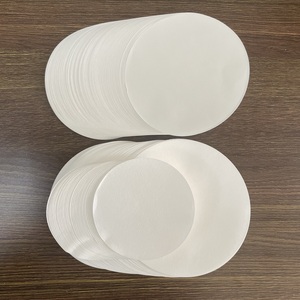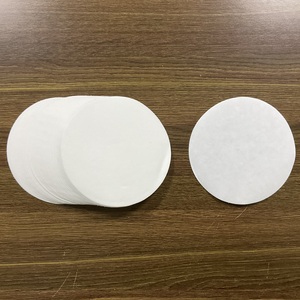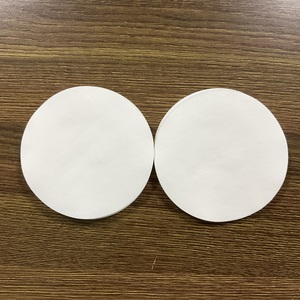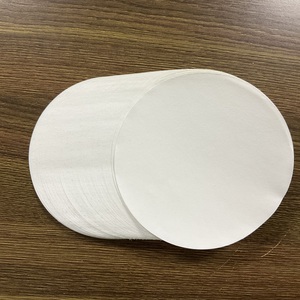Types of oil filter paper
Oil filter paper is a specially made paper that can bear high temperatures and has the capacity to absorb contaminants and impurities. This is a key part of oil filters, especially in cars and machines. There are many types of oil filter papers for various types of oils and filters.
-
Grinding Filter Paper:
This is mostly made with cellulose, designed for use in oil production facilities and refineries. Its primary objective is to isolate solid impurities within the crude oil. Typically, these solids comprise sand, silt, and other deposition materials. By doing so, the filter paper ensures that the resultant filtered oil is both high-quality and devoid of any potentially damaging contaminants. Once the oil has been successfully traversed through the filter fabric, the liquid extract can then be processed further by means of a multitude of refining techniques to yield the final product.
-
Synthetic Oil Filter Paper:
Synthetic oil filter papers are a modern solution to the age-old problem of oil contamination in engines and machinery. Unlike traditional cellulose-based filters, these synthetic filter papers are engineered from a combination of polyester fibers and other man-made materials. This unique composition not only boosts the filtering efficiency but also elevates the dirt-holding capacity of the filter.
One of the standout features of synthetic oil filter papers is their ability to capture even the tiniest of particles. This includes microscopic dirt, debris, and contaminants that can cause significant wear and tear on engine components if left unchecked. By ensnaring these minute impurities, synthetic oil filter papers play a pivotal role in prolonging the lifespan of engines, ensuring they run smoothly and efficiently for extended periods.
-
Cellulose Oil Filter Paper:
Cellulose oil filter paper, primarily composed of wood pulp, has been a staple in the automotive and machinery sectors for decades. Its fundamental role is to intercept and capture various types of contaminants that can jeopardize the integrity and functionality of hydraulic systems and engines. Such impurities may encompass dust, carbon particles, water, and metallic debris, all of which can inflict irreversible damage if allowed passage.
The functioning of cellulose oil filter paper is straightforward yet effective. As oil traverses through the filter, the cellulose fibers ensnare and immobilize these contaminants, ensuring that only clean, filtered oil continues to circulate within the system. This process is vital, not just for protection, but also to enhance the performance of the equipment in which the filter is situated.
Specifications and maintenance of oil filter paper
Specifications
- Absorbency: The quantity of oil it can soak up before becoming saturated is represented by this metric.
- Thickness: The thickness of the paper is generally proportional to its lifespan and filtering ability. Filters that are thicker can trap more dirt because they have deeper pore structures.
- Filtration Pore Size: The filter paper is made to capture specific particle sizes. Engine wear particles, impurities, and other relatively large particles can all be trapped by it.
- Flow Rate: The speed at which oil can pass through the filter paper relates to the oil circulation of the engine. High filtering efficiency and low blockage are both important components of good filtration.
- Saturation Rate: The speed at which the oil filter paper becomes saturated is also important to understand. Businesses can plan oil filter replacement intervals based on this.
- Dimensions: The diameter and thickness of filter paper are usually specified to ensure that they fit into the filter housings of different models.
Maintenance
- Oil Filter Replacement: The main maintenance task related to filter paper is to replace it with a new oil filter. Adhere to the vehicle maintenance manual and recommendations for oil filter replacement.
- Inspection During Oil Change: Check the oil filter condition during routine oil changes. Look for signs of damage or deformation in the filter paper. If anything seems wrong, replace it.
- Choose Quality Oil Filters: Although this is not directly related to the maintenance of filter paper, choosing quality oil filters can help ensure the quality of the filter paper.
- Keep the Environment Clean: When replacing oil filters, keep the environment clean and avoid pollutants and impurities touching the filter paper to ensure its purity and cleanliness.
Usage scenarios of oil filter paper
Oil filter papers are used in various industries, including automotive, petroleum, manufacturing, and food and beverage. Below are some usage scenarios of oil filter papers.
- Automotive oil and air filtration: Oil filter papers are widely used in automobiles to filter engine oil. They trap impurities like carbon residue, metal particles, and dirt to ensure clean oil circulates in the engine, promoting optimal performance and extending the engine's lifespan. Automotive oil filter manufacturers use high-quality oil filter papers to ensure customers’ needs are met.
- Industrial oil and coolant filtration: Many manufacturing industries use oil filter paper to maintain the quality of cutting fluids and lubricating oils. They are used in machining processes, such as metal cutting and milling, where oil act as a coolant and lubricant. Clean cutting fluids enhance product quality, reduce tool wear, and improve machining efficiency.
- Hydraulic oil filtration: Oil filter papers are used to filter hydraulic oil in hydraulic systems. They help remove water, dirt, and degradation products to maintain smooth operation and prevent system failures.
- Edible oil filtration: In the food industry, oil filter papers are used to refine and purify edible oils. They assist in removing unwanted substances like pigmentation, wax, moisture, and volatile compounds to improve oil quality and prolong shelf life.
- Engineering oil filtration: In the petrochemical industry, oil filter papers are used in oil exploration and production processes to ensure the quality of hydraulic fluids, lubricant, and cutting oils used in drilling and extraction operations. High-quality filter papers help prevent equipment damage and maintain system efficiency.
- Laboratory filtration: Many laboratories use small oil filter papers to clean or purify small volumes of oil or chemicals. They are used as part of chromatography techniques to separate chemical compounds.
- Air filtration: Besides oil filtration, paper filters are also used in air filters, especially those that keep dust and particles away from the vehicle's engine. They allow clean air to enter the combustion chamber to enhance engine performance.
How to Choose Oil Filter Paper
When buying oil filter paper for use or resale, buyers should keep the following tips in mind:
- Model Application: Verify that the filter paper's model number corresponds to the customer or engine's specification. Different filter papers are designed for specific oil filter bodies, so proper matching is essential for effective filtration.
- Brand and Quality: Choose reputable filter paper brands known for producing durable and effective filter papers. Conduct research to select filter papers that offer excellent filtration performance and reduce oil degradation.
- Environmental Concerns: Opt for filter papers that have eco-friendly disposal options, contributing to a more sustainable automotive industry. Some filter papers can be recycled, while others have biodegradable materials.
- Cost and Value: Evaluate the cost of the filter paper compared to its quality and performance. Consider the long-term value it brings in terms of engine maintenance and oil preservation.
- Availability: Ensure a steady supply of filter papers to avoid operational disruptions. Choose filter paper suppliers with reliable distribution channels to ensure constant access to filter paper when needed.
Q & A
Q1: Which parameters should business buyers use to filter engine oil filter paper suppliers?
A1: Consider using the product types parameter. It will help to narrow the search to suppliers that specialize in providing the desired filter papers. Also, users’ reviews should be a significant buying criterion. Oil filter papers serve a crucial purpose. Filter papers with poor manufacturing quality can result in engine damage. Therefore, it is essential to settle with filter paper suppliers that commercial buyers have previously applauded.
Q2: What are the emerging trends in the oil filter paper market?
A2: The oil filter paper market is evolving due to several trends. There’s a gradual adoption of synthetic filter papers. Synthetic filter papers produce stunning filtration results. They also have longer service lives. Another rising trend is the use of biodegradable oil filter papers. Such filter papers manufacture companies reduce environmental impacts to comply with the industry standards.
Q3: Which oil filter papers types are best for resale?
A3: The best oil filter paper type for resale depends on the target market. If the market comprises users of industrial machines and heavy vehicles, consider reselling synthetics and multigrade oil filter papers. Those filter papers types offer exceptional performance and can withstand high loads. Biodegradable oil filter papers would be popular with environmentally-conscious consumers. Also, check the oil filter specifications that comply with most vehicle manufacturers standards. Filter papers with such specifications have higher demand.



























































































































































































































